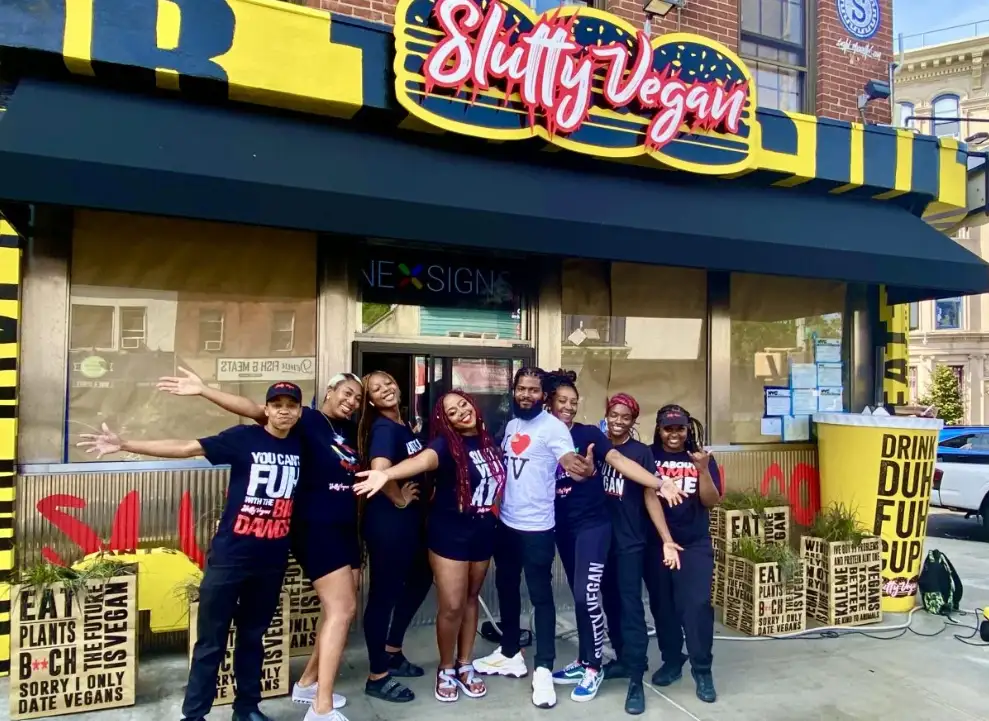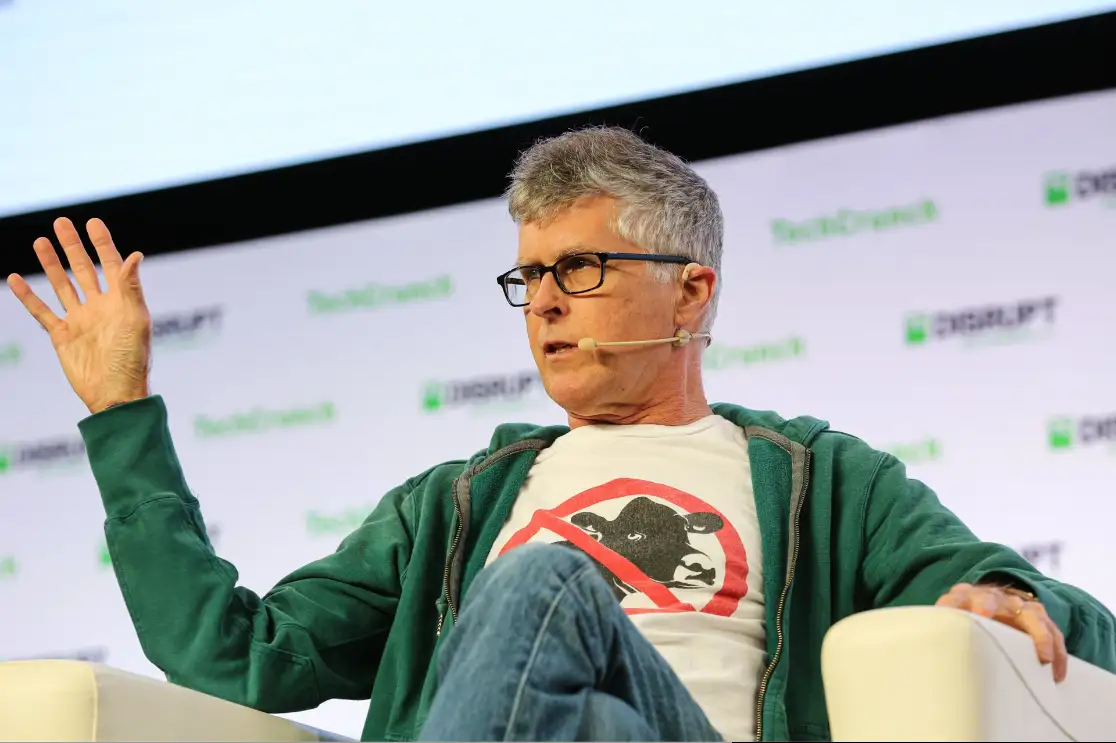Community
Can Restaurants Save Meatless Meat?
February 7, 2023
Don’t declare meat alternatives over until chefs have had their say.
For more than a decade, plant-based meat alternatives have been the buzziest topic in the culinary world. With mission-first branding and boatloads of VC funding, companies like Beyond Meat and Impossible Foods have gained almost as much attention for tech-like business growth as for their innovative products. Recently, though, some of the hype has fizzled away.
By any metric, 2022 was a bad year for meat substitutes. Beyond Meat, the sector’s leading brand, saw its share price fall by more than 80%. Companies across the industry laid off workers, once-promising partnerships began to evaporate, and large companies that had placed big bets divested from the space. Bloomberg Businessweek, sensing blood in the water, published a cover story in January 2023 declaring the “fad” to be over: “Beyond Meat and Impossible Foods wanted to upend the world’s $1 trillion meat industry. But plant-based meat is turning out to be a flop.”
Harsh words from a publication that somewhat famously likes to announce the demise of startup dreams. (See: Juicero.) But there’s one reason in particular to believe that meatless meat has a long way to go before it becomes a punchline:
Restaurants.
Here’s the case for why, although plant-based meat has fallen short of expectations, the products are probably here to stay — especially if a creative chef or two can score a hit.

The opening of Atlanta-based Slutty Vegan’s Brooklyn location. Source
Meatless meat’s problems
Sales may be down, but that’s far from a wholesale consumer rejection of meat alternatives. Really, the sector’s primary problem is that it fell short of overly aggressive forecasts set by investors and founders.
Plant-based meat substitutes have been around for a long time. Stalwarts like Morningstar Farms and Field Roast have enjoyed consistent demand for decades. Then came Beyond and Impossible in 2009 and 2011, both of which engineered futuristic imitations of meat. These two startups differentiated themselves from the rest of the industry as tech companies that invented food rather than food companies that used science.
Technology has always been at the core of both organizations. Prior to founding Beyond Meat, Ethan Brown served as an official on two prestigious science councils. Impossible Foods founder and former CEO Pat Brown (no relation) holds a PhD in biochemistry. It was under Pat Brown’s leadership that Impossible debuted its new-and-improved burger patty not at a food show, but at the 2019 Consumer Electronics Show. They called their product the Impossible Burger 2.0. If you weren’t familiar, you might think a new app was being launched.

Impossible Foods founder Pat Brown. Source
The tech angle has had a number of branding implications — notably, to present the highly processed food as “futuristic” instead of “artificial” — but it has also influenced the way Beyond and Impossible do business. Both CEOs claimed their companies were fulfilling high-minded, world-saving missions. They also accepted funding from venture capitalists, which almost certainly spurred them to promise rapid, explosive growth. Not something you’d normally expect from a line of veggie burgers, no matter how 2.0.
For a while, the hype around this new generation of high-tech protein was enough to sustain interest and investment. Both companies struck high-profile partnerships with chains like McDonald’s, Burger King, Starbucks, and more. But growth was never astronomical: only 9% annually between 2017 – 2021, according to market research firm GlobalData. That’s a far cry from the “double-digit portion of the beef market by 2024” that Pat Brown promised in 2019.

RESOURCE
Restaurant Menu Design & Copywriting
In this e-book, you'll find detailed tips for visual menu design, specific suggestions on menu copywriting and real menu examples from BentoBox customers.
Factor in many other influences on the market — from boardroom drama to inflation to, tellingly, a host of new companies entering the meat alternative sector — and it becomes understandable why valuations of Beyond Meat and Impossible Foods have slumped over the last year. With all this in mind, it is probably more accurate to say that investor optimism was overzealous at the height of the meatless meat frenzy than to proclaim the sector a “fad” that has run its course.
Restaurants to the rescue
Regardless of what happens to either Beyond Meat or Impossible Foods, the technology they developed exists. Plant-based meat has taken a big step forward, and it’s not going back.
Who will take the movement from here? Chefs.
The best-case scenario, which was what Beyond and Impossible sold investors, was that a big segment of the meat-eating public would transition to meat alternatives. Clearly, that has not happened. A more probable long-term success story involves innovative chefs and restaurants developing recipes, marketing them organically, and changing plant-based eating from a Silicon Valley blitzkrieg into a culinary movement.
One reason restaurants make sense for the future of plant-based food is that restaurants solve the price point issue. In a grocery store, many price-sensitive shoppers are still choosing Morningstar’s basic veggie burger option over the more expensive Impossible Burger or Beyond Burger. In a restaurant, splurging for a superior product is more natural.
Restaurants are also a somewhat captive market. In order to preempt the so-called “veto vote” — that one diner who’s a vegetarian or has allergies and routes the entire dining party to another restaurant — restaurants need to offer meat alternatives. The average restaurant menu, in other words, is much likelier to feature plant-based meats than the average grocery basket. This means more experimentation will happen in restaurant kitchens than residential ones.
And it is with those exact powers of innovation and branding that restaurants — and creative chefs, specifically — can make consumers want to try the product.
To put it in the technology terms so favored by Beyond and Impossible, every revolutionary platform needs a “killer app”: that one software program that makes every office worker go out and buy their first PC, or that one hit video game that puts the new console in every teenager’s home. A killer app transforms new technology from merely interesting to essential. Plant-based meat needs the same thing; call it a killer appetizer.
Beyond and Impossible have engineered a revolution in consumer-grade food science, but right now their fans probably think of their products as more expensive versions of the black bean burgers they’ve been eating for years. What the sector needs is for a plant-based meat dish to go viral; to have a chef unlock the real potential of the food and give the public a fresh idea of what it can be.
To date, the restaurant partnerships the industry has been most excited about have featured national QSR chains like Burger King, White Castle, KFC, and the like. This strategy tracks with the companies’ fixation on rapid growth, but it hasn’t seemed to capture many imaginations in the dining public. According to Bloomberg, “None of the biggest fast-food chains that had announced partnerships with Beyond have put a single permanent item on their US menus.”
Far more interesting prospects lie in the hands of smaller restaurants and their chefs. Atlanta-based Slutty Vegan is doing what an Impossible Whopper could never: putting plant-based burgers at the center of a genuinely trending viral experience. NYC’s Beatnic (formerly known as By CHLOE) is creating plant-based dishes that would never occur to the average shopper in the frozen aisle. Restaurants like these generally sell to young, high-earning urbanites: the kind of trendsetting customer base that can grow organically and weave plant-based meat into the culture.

After the hype cycle
In an interview with The Spoon, former Impossible Foods executive Rachel Konrad responded to Bloomberg’s takedown of the plant-based industry by arguing that, no, this isn’t the end for Beyond or Impossible; we’ve simply reached the “Trough of Disillusionment” in Gartner’s famous Hype Cycle for emerging technologies.
With any new technology, Konrad said, “There’s this inevitable deflation when the reality hits that it’s not going to change the world next year like we said it would. But then it continues to grow” — probably a lot less dramatically than before — “and has transformative effects in the long run.” This, she predicted, would be the course of plant-based meat.
To get to that point, the future is in the hands of restaurants: the chefs and influencers and dining scenes that are able to take a raw foodstuff that is only a few years old, and make it into something people have never seen before. Something people really want, and can’t get any other way.
Recommended

Community
How North Carolina Became a Restaurant Powerhouse
June 24, 2024
The Tar Heel State is the nation’s fourth-biggest for new restaurant openings despite being ninth biggest in terms of population. Here’s what’s behind the growth.

The BentoBox 25
Supporting Women in Hospitality with Chef Elena Reygadas
May 14, 2024
Beyond shaping the city’s food scene at restaurants like Rosetta, the CDMX native has been an outspoken advocate for women pursuing culinary careers.

The BentoBox 25
Lewis Barbecue Brings High-Touch Hospitality to Texas BBQ
May 14, 2024
How the Charleston, SC restaurant group brings authentic Texas BBQ to a new environment.


